

— Products —
 Consumer hotline +8618073152920
Consumer hotline +8618073152920 WhatsApp:+8615367865107
Address:Room 102, District D, Houhu Industrial Park, Yuelu District, Changsha City, Hunan Province, China
Weather Stations
The integrated wind speed and direction sensor consists of a wind speed sensor and a wind direction sensor. The wind speed sensor adopts the traditional three-cup wind speed sensor structure, and the wind cup is made of carbon fibre material with high strength and good start-up.The wind direction sensor adopts a precision potentiometer and a low-inertia light metal wind vane to respond to the wind direction, with good dynamic characteristics.It can be widely used in meteorolo···
Tel/WhatsApp:+8615367865107
Email:Arvin@niubol.com +Nearly 100 partner company in more than 68 countries. We are committed to providing high-quality, practical products to meet your needs and help you solve problems.Product Details
An Integrated Wind Speed and Direction Sensor is a sensor device that combines the functions of measuring wind speed and direction. Here is an introduction and the advantages of this sensor:
Integrated wind speed and direction sensor technical parameters:
| Wind speed sensor: | |
| Measuring range: | 0~45m/s, 0~70m/s optional |
| Accuracy: | ±(0.3+0.03V)m/s (V: wind speed) |
| Discrimination rate: | 0.1m/s |
| Start wind speed: | ≤0.8m/s |
| Product weight: | 130 g |
| Product power consumption: | 50 mW |
| Measuring range: | 0 to 360° |
| Resolution: | 1° |
| Accuracy: | ±3° |
| Start wind speed: | ≤0.5m/s |
| Product weight: | 210 g |
| Product power consumption: | 5.5 mW |
| Cable rating: | rated voltage: 300V , temperature rating: 80°C |
| Power supply: | 5V/12V/24V |
Wiring method: | Voltage type: 4 wires, current type: 4 wires, RS-485 signal: 4 wires |
| Signal output: | 0-5V /4-20 mA /RS485 |
| RS-485 signal: | support ModBus protocol (baud rate 9600 can be set, address 0-255 can be set) |
| Material: | metal shell, engineering carbon fibre airfoil and tailpiece, good strength, higher sensitivity |
| Working environment: | Temperature -40℃~50℃ Humidity ≤100%RH |
| Protection class: | IP45 |
1. Device introduction: An Integrated Wind Speed and Direction Sensor integrates the capabilities of both a anemometer (wind speed meter) and a wind vane (wind direction sensor). It can simultaneously measure both wind speed and wind direction. It typically consists of a main body structure that includes a rotating wind vane and a device for measuring wind speed. This integrated design simplifies the installation and usage process, reducing the space required by the equipment.
2. Integrated Wind Speed and Direction Sensor Advantages:
Comprehensive measurement: Traditional anemometers and wind vanes require separate installation and independent measurements, whereas an Integrated Wind Speed and Direction Sensor provides reliable measurements of both wind speed and wind direction simultaneously. It allows for a more comprehensive understanding of wind field variations.
Accuracy: An Integrated Wind Speed and Direction Sensor offers high measurement accuracy. Through its precise measuring device and sensitive sensors, it can provide accurate wind speed and wind direction data to meet the requirements of various application fields.
Quick response: The integrated sensor can rapidly respond to changes in the wind field. It can provide real-time wind speed and wind direction data within a short period, facilitating timely monitoring and decision-making.
Durability: Integrated sensors are typically constructed using high-quality and durable materials. They possess strong resistance against wind, dust, and water, making them suitable for operation in various harsh environmental conditions.
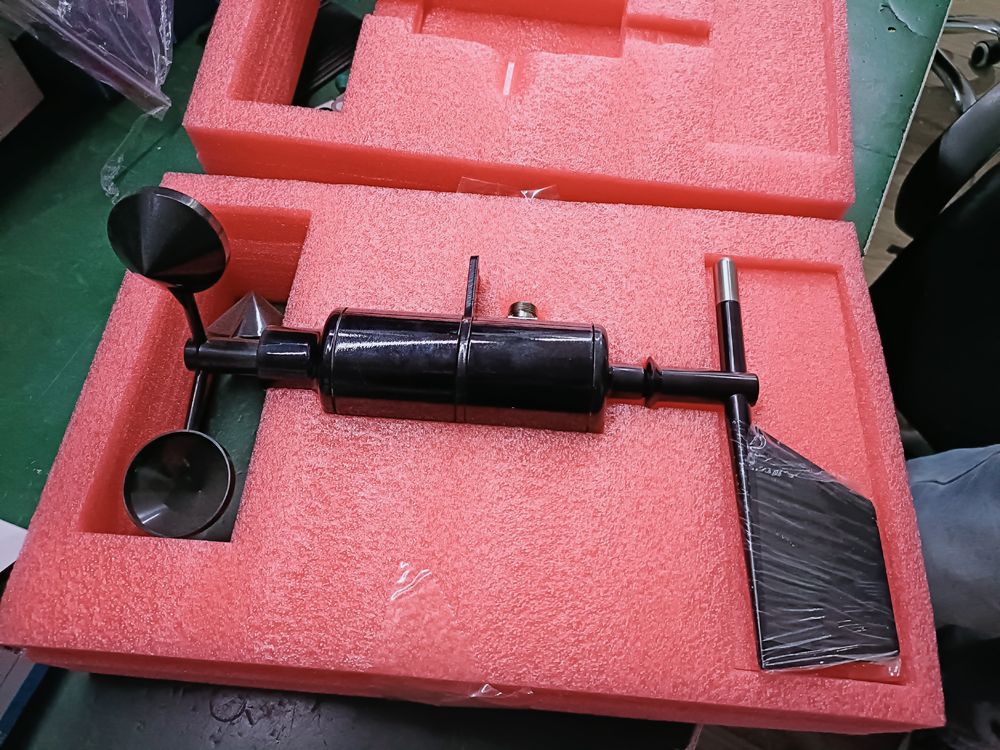
3. Integrated Wind Speed and Direction Sensor Application value:
Weather observation and forecasting: Integrated Wind Speed and Direction Sensors are widely used in meteorological observation and weather forecasting. They provide accurate wind field data, helping meteorologists understand wind intensity and direction for tasks such as weather prediction and risk assessment.
Aviation and maritime: In aviation and maritime domains, precise wind speed and wind direction information are crucial for flight and navigation safety. Integrated Wind Speed and Direction Sensors can provide real-time and accurate wind field data for aircraft, ships, etc., assisting pilots and captains in making informed operational decisions.
Greenhouse and agriculture: Wind speed and direction play a crucial role in greenhouse and agricultural management, as they can influence crop growth. Integrated sensors can be used to monitor and record changes in the wind field, enabling better decisions regarding irrigation plans or adjustments to greenhouse ventilation.
In summary, an Integrated Wind Speed and Direction Sensor combines the capabilities of measuring wind speed and direction, offering advantages such as comprehensive measurement, high accuracy, quick response, and durability. It holds significant application value in weather observation, aviation and maritime operations, agriculture, and other fields by providing crucial data support.
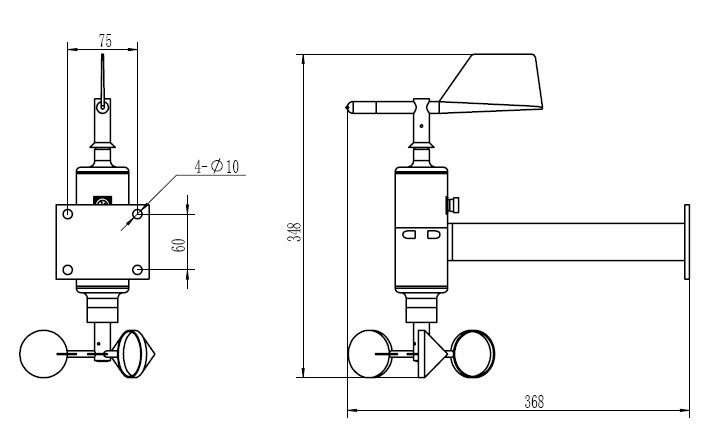
The integrated wind speed and direction sensor consists of a wind speed sensor and a wind direction sensor.
The wind speed sensor adopts the traditional three-cup wind speed sensor structure, and the wind cup is made of carbon fibre material with high strength and good start-up.
The signal processing unit inside the cup can output the corresponding wind speed signal according to the user's needs. The wind direction sensor adopts a precision potentiometer and a low-inertia light metal wind vane to respond to the wind direction, with good dynamic characteristics.

Integrated wind speed and direction sensor application scenarios:
The product has the advantages of large measuring range, good linearity, strong resistance to lightning strikes, convenient observation, stability and reliability, etc.
It can be widely used in meteorology, marine, environment, airport, port, laboratory, industry and agriculture and transportation.
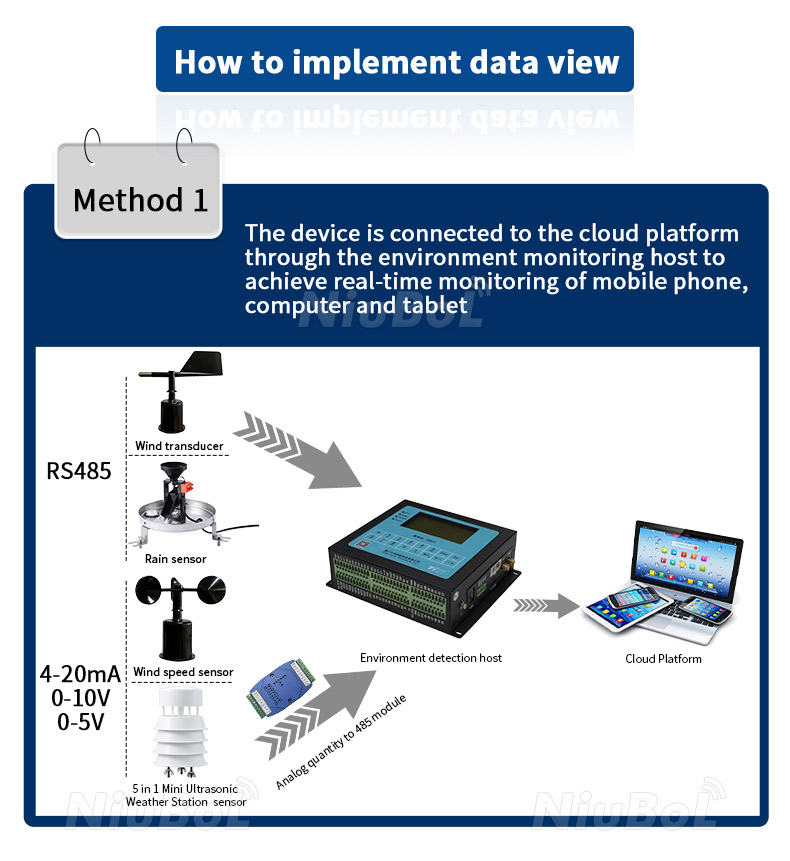
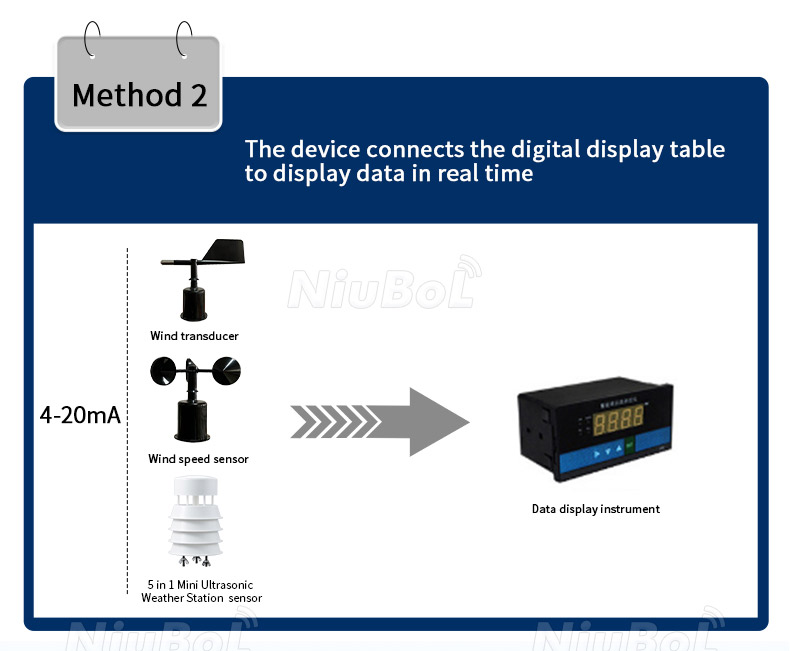
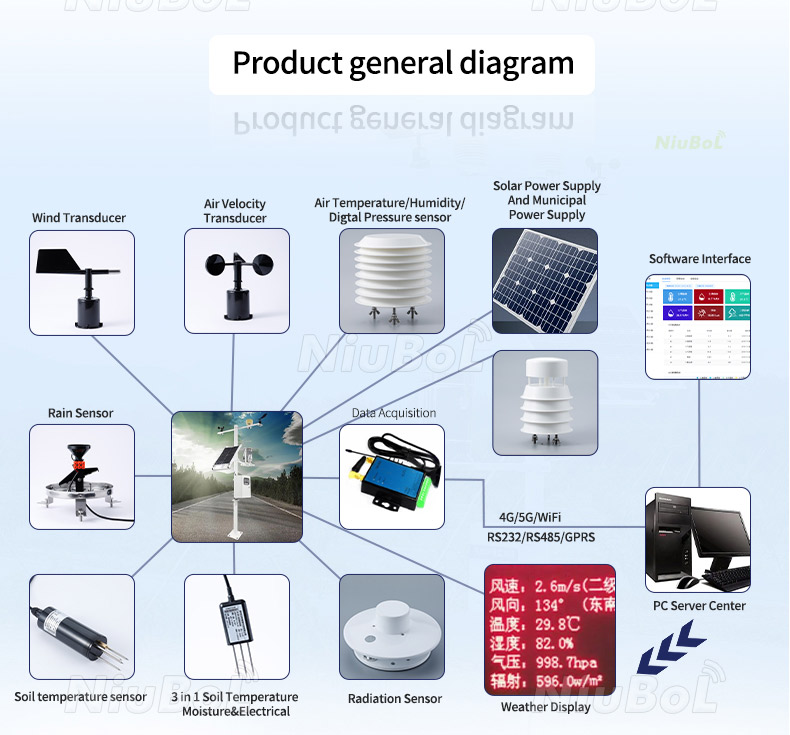
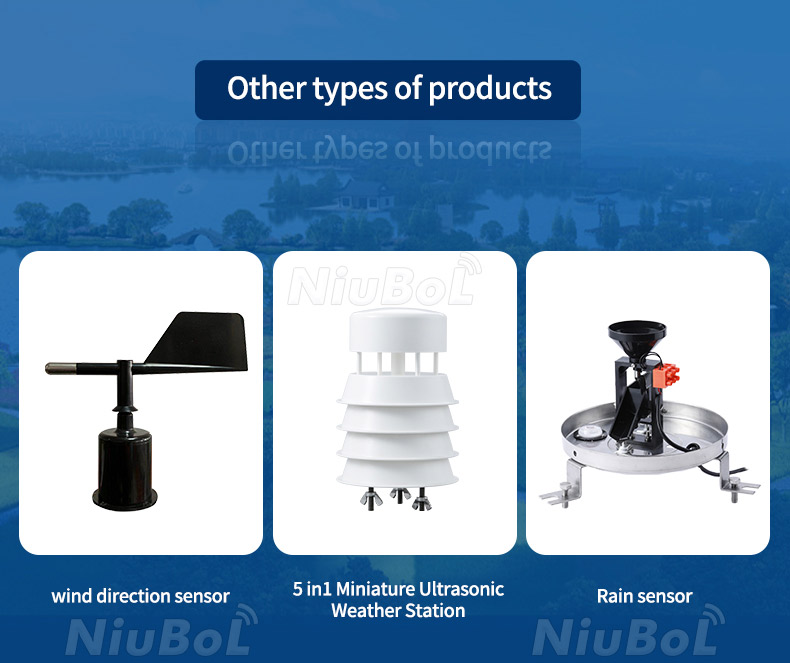
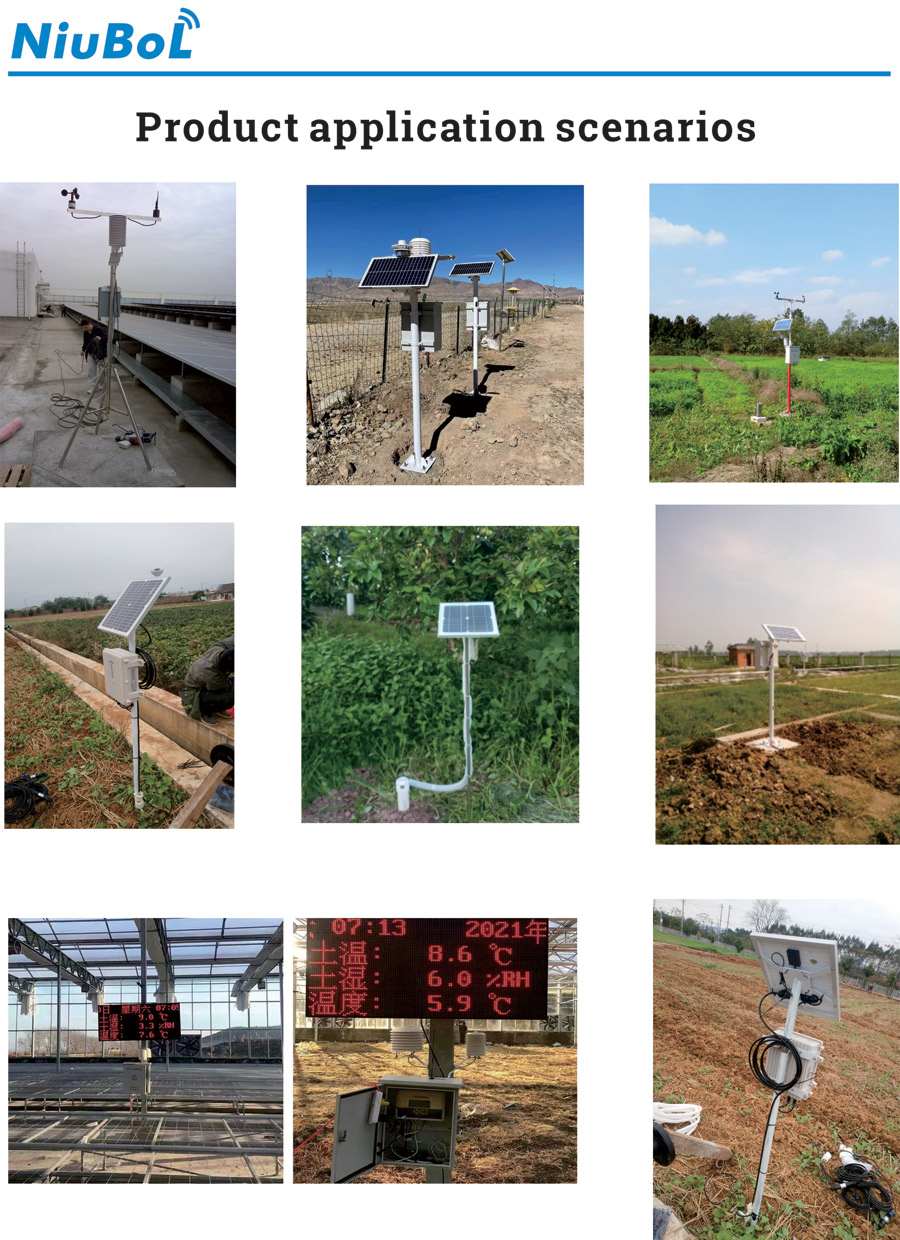
One-piece wind speed and direction sensor installation:
When installing the sensor, please ensure that the wind direction sensor is on the top and the wind speed sensor is on the bottom, and that the sensor is installed in a vertical direction to the ground, there is a white fixing point on the wind direction sensor, please refer to the compass included with the product to keep the wind direction guide direction in line with the geographical south before use.
Troubleshooting :
1、The wind vane rotation is not working, the hysteresis is big. May be due to long-term use There are foreign objects in the bearing or the lubricant is used up. Please fill the instrument oil from the upper bearing of the sensor or send the sensor back to the company for oil injection. The oil should be injected from the upper bearing of the sensor or the sensor should be returned to the company.
2. When the analogue output is used, the display shows a value of 0 or not in range. 2. When the analogue output is displayed, the display shows a value of 0 or not within range. It is possible that the collector is not getting the correct information due to a wiring problem. Check that the wiring is correct and secure. Please check that the wiring is correct and secure.
3、If not for the above reasons, please contact the manufacturer.
NBL-W-WSDS-Integrated-wind-speed-direction-sensor-User-Manual.pdf
Sensors & Weather Stations Catalog
Agriculture Sensors and Weather Stations Catalog-NiuBoL.pdf
Weather Stations Catalog-NiuBoL.pdf
Related recommendations
 Wind Speed sensor Output Modbus/RS485/Analog/0-5V/4-20mA
Wind Speed sensor Output Modbus/RS485/Analog/0-5V/4-20mA Tipping bucket rain gauge for weather monitoring auto rainfall sensor RS485/Outdoor/stainless steel
Tipping bucket rain gauge for weather monitoring auto rainfall sensor RS485/Outdoor/stainless steel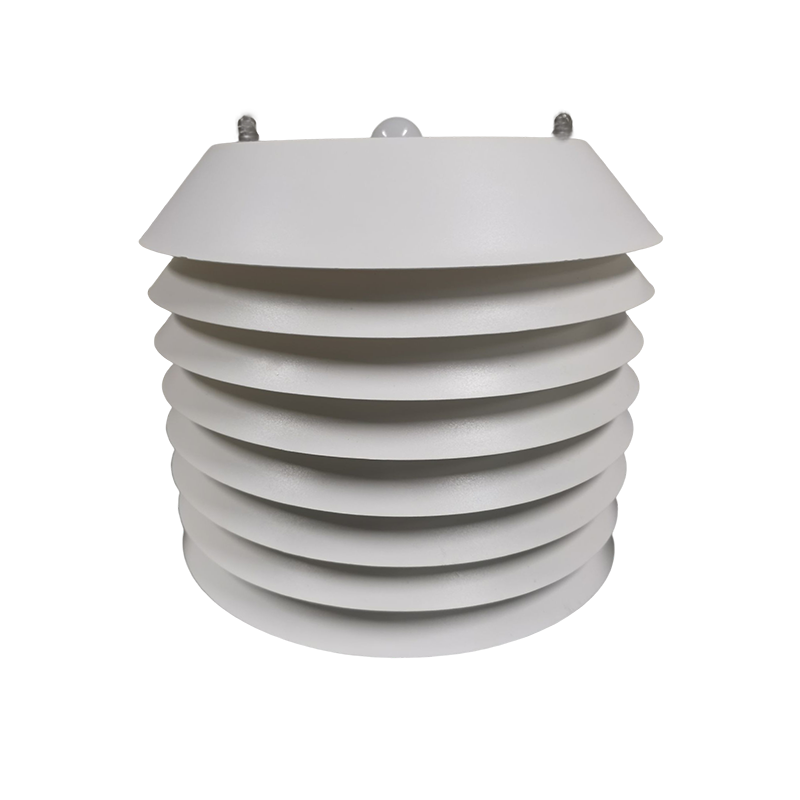 5-in-1 Temperature, Humidity, Air Pressure, Illumination, CO2 Sensor
5-in-1 Temperature, Humidity, Air Pressure, Illumination, CO2 Sensor 5 in1 Ultrasonic weather stations Atmospheric Pressure Temperature Humidity Wind Speed Direction sensor
5 in1 Ultrasonic weather stations Atmospheric Pressure Temperature Humidity Wind Speed Direction sensor 6 in1 Ultrasonic Weather Station Sensor for industrial & agricultural & environmental monitoring
6 in1 Ultrasonic Weather Station Sensor for industrial & agricultural & environmental monitoring 7 in 1 Ultrasonic Weather Station Sensor for Wind speed,Wind direction,Temperature, humidity, pressure,Illumin···
7 in 1 Ultrasonic Weather Station Sensor for Wind speed,Wind direction,Temperature, humidity, pressure,Illumin···
Screenshot, WhatsApp to identify the QR code
WhatsApp number:+8615367865107
(Click on WhatsApp to copy and add friends)